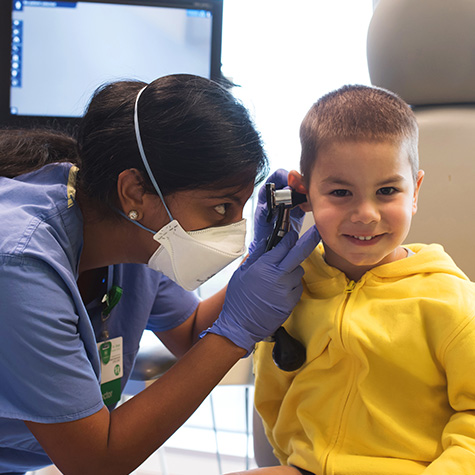How Do I Know if My Child Has Strep Throat?
Updated 4/5/21
If you suspect that your child has strep throat, there are specific symptoms you can keep an eye out for at home. But it’s also important to take your child to the doctor for a strep test as soon as possible to help confirm the contagious bacterial infection.
Strep throat is a bacterial infection that infects the throat and tonsils. Nearly 40% of kids who are complaining of a sore throat have strep throat, and it’s most common among children who are in day care and elementary school.
“It is contagious and often transmitted when kids come in contact with respiratory droplets that carry the bacteria,” says Clarice Brown, MD, a Pediatric Otolaryngologist at Children’s Healthcare of Atlanta. “Transmission can take place when an infected child sneezes, coughs or touches a contaminated surface.
Common symptoms of strep throat in a kid may include:
- Fever
- Sore throat
- Swollen lymph nodes in the neck
- Red spots at the back of the roof of the mouth
“Younger kids who can’t articulate what’s going on with them may be very fussy and irritable,” Dr. Brown says. “Some kids may even say they have a headache or abdominal pain or experience vomiting.”
However, symptoms like a cough and nasal congestion are not usually signs that a child has strep throat.
If you think your child has strep throat, don’t hesitate to get him tested.
“Children who have symptoms of strep throat should be screened,” Dr. Brown says. “This will include either a rapid strep test or a throat culture.”
Both tests can be done in a doctor’s office or at an urgent care center.
“The tests involve swabbing your child’s throat, as well as his tonsils, but it’s not painful,” Dr. Brown explains. “The rapid strep test is very helpful because you get the results within 10 to 15 minutes, which means you can go ahead and start treatment soon. However, the gold standard—or the best way to diagnose strep throat—is with a throat culture. Unfortunately, the results don’t usually come until one to three days later. Most often, though, the rapid strep test is performed.”
How can parents tell the difference between a sore throat (that may not need medical attention) and strep throat?
A sore throat is typically due to a virus and can be accompanied by sneezing, coughing, a low-grade fever and a stuffy nose. The infection usually improves on its own and doesn’t require antibiotics.
“However, it’s sometimes hard to distinguish the symptoms between a sore throat and strep throat, so a rapid strep test or throat culture is the most accurate way to diagnose strep,” adds Dr. Brown.
If your child is diagnosed with strep throat, he will be prescribed antibiotics, such as penicillin or amoxicillin. An antibiotic will help reduce the duration of symptoms caused by strep throat, as well as decreasing the risk of rare but serious complications of the bacterial infection, such as acute rheumatic fever.
What if my child is considered a strep throat “carrier?”
If your child tests positive for strep throat but has no symptoms, he is considered a chronic carrier of the bacterial infection.
“There is no need to treat a child with what we call a ‘chronic carrier state,’ unless they have had a complication secondary to strep throat like kidney inflammation or rheumatic fever, or if they are around people who work in healthcare, where they could eventually spread the chronic infection,” says Dr. Brown.
Talk to your child’s doctor to learn more about whether he may be a carrier.

When it comes to your child, where you take them matters.
If your child has ear infections, strep throat or other issues that impact their ears, nose or throat, find a pediatric otolaryngologist or click the link below to schedule an appointment.
Make an AppointmentIn addition to prescribing antibiotics, your child’s doctor may recommend that your child get plenty of rest and drink lots of fluid. If pain persists, you can give your child acetaminophen or ibuprofen to help treat discomfort. Aspirin and aspirin-containing products shouldn’t be given to children or adolescents unless instructed by a physician. Be sure to check instructions on the box to make sure you are giving your child the correct amount of medication based on his age and weight.
Can I give my child throat-numbing sprays for pain?
A chloraseptic spray or topical anesthetic spray, which numbs throat tissues and can help ease discomfort and provide relief when your child is swallowing, is also helpful if throat pain continues. Be sure to review instructions on the box for dosing information.
What if my child is complaining about eating or drinking because of strep throat pain?
When it comes to eating, feed your child soft-textured foods, such as popsicles, mashed potatoes, oatmeal, ice cream or a smoothie. The throat can be very sensitive when infected, so also be sure that foods and liquids are not too hot.
When is strep throat no longer contagious?
Children are no longer considered contagious 24 hours after starting antibiotics. This means they can interact with other people, including returning to school or day care.
Is there any way to prevent strep throat from spreading?
There are ways to reduce the risk of getting or spreading strep throat, including following proper hand hygiene and teaching your child to cover his mouth and nose when he coughs or sneezes.
If my child continues getting strep throat, will he need a tonsillectomy?
Children with recurrent strep throat infections may be considered for a tonsillectomy, which is a surgery in which your child’s tonsils are removed.
“If a child doesn’t meet these criteria but develops an allergy to commonly used antibiotics or develops antibiotic intolerance, or if they have a complication secondary to an infection, a tonsillectomy can be considered with these circumstances,” says Dr. Brown.
A tonsillectomy may be recommended if your child is diagnosed with strep throat:
- Seven or more times in one year;
- Five times a year for two years; or
- Three a year for three years.
Clarice Brown, MD, joined Children’s Healthcare of Atlanta as a Pediatric Otolaryngologist and Emory University as an Assistant Professor in the fall of 2020. She completed her residency in otolaryngology–head and neck surgery at University at Buffalo and completed her pediatric otolaryngology fellowship at University of Texas Southwestern Medical Center. Dr. Brown is a member of the American Academy of Otolaryngology–Head and Neck Surgery and a fellow member of the American Society of Pediatric Otolaryngology.
This content is general information and is not specific medical advice. Always consult with a doctor or healthcare provider if you have any questions or concerns about the health of a child. In case of an urgent concern or emergency, call 911 or go to the nearest emergency department right away. Some physicians and affiliated healthcare professionals on the Children’s Healthcare of Atlanta team are independent providers and are not our employees.
Contact Us 404-785-KIDS (5437)



